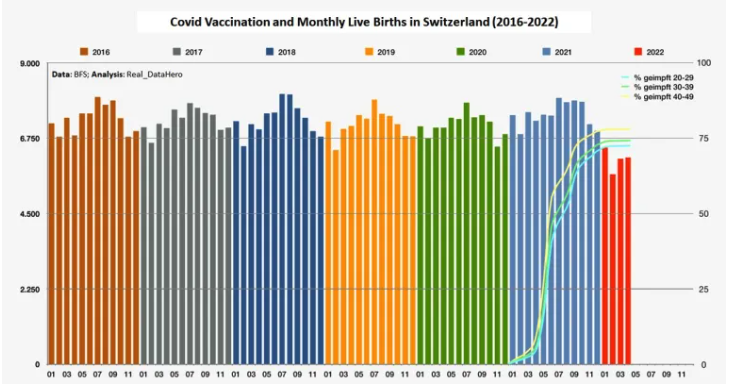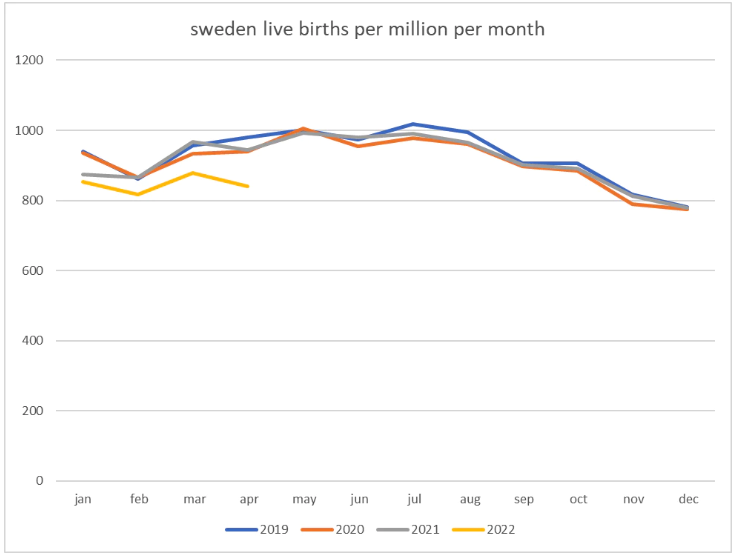Why is there a substantial decrease in births in Germany, Switzerland, and other countries nine months after the beginning of COVID mass vaccinations?

Do covid vaccines impact male or female fertility?
An Israeli study recently published in the scientific journal Andrology seemed to have found a 15% decrease in sperm concentration three months after mRNA covid vaccination. The authors argued the decrease was temporary, but the data didn’t actually show a recovery, just a wider confidence interval. However, the study was very small (just 37 participants), it had no control group (to exclude external effects), and several other studies found no such decrease in sperm concentration – some even found a supposed increase, highlighting the complexity of such measurements.
Thus, contrary to claims by some covid vaccine skeptics, the recent Israeli study didn’t prove that covid mRNA vaccination reduces sperm concentration or quality. In fact, there is currently no strong evidence showing such an effect. On the other hand, a covid infection may temporarily impact sperm quality, but this is not unexpected after any infection or disease.
That being said, new birth data out of Germany and Switzerland raises some serious questions. Specifically, both countries recorded a consistent 10% to 15% decrease (compared to expectations) in monthly births from January to March/April 2022 (the latest available data) – that is, precisely nine months after the beginning of covid mass vaccination in the general population in April/May 2021 (see charts above and below).
This is also seen in data from Sweden:

How can this substantial decrease be explained? Is it due to behavioral or biological factors?
The German winter lockdown ended only in May 2021, whereas the much softer Swiss lockdown ended already in early March 2021. Data from Britain and from New York had already shown that during the first lockdowns in early 2020, 10% to 20% fewer babies were being conceived. Thus, it is possible that the decrease in German and Swiss birth rates is a direct or indirect result of lockdowns, although the time frames do not entirely match (no decrease in late 2021, nor in late 2020).
Indirect effects of lockdowns or the pandemic include the fact that many countries have seen a significant decline in marriages and dating in 2020 and 2021, which could explain a subsequent decline in births. Economic and psychological factors could further exacerbate the situation, although the sudden decline in early 2022 remains somewhat mysterious.
In terms of biological factors, Germany and Switzerland both had two covid delta waves in summer and early winter of 2021 that may have influenced live birth rates (e.g. by increasing miscarriages), but the decrease in births is really only visible since January 2022. Recent birth data from other countries, including Britain and the US, does not seem to be available yet (see updates below).
What about covid vaccinations? Covid vaccinations could influence fertility and conception, miscarriages (prior to week 20, normally affecting 10% to 20% of all pregnancies, sometimes undetected), and/or stillbirths (after week 20, normally affecting about 0.5% of all pregnancies). Previous studies argued that covid vaccination had no impact on stillbirths, but independent reanalysis showed that the data does in fact indicate a 30% increase in stillbirths.
Furthermore, there have been widespread and officially acknowledged reports of post-vaccination menstrual disorders (over 30,000 reports in Britain alone); official reports of vaccine adverse events including death in breastfeeding babies (over 60 reported cases in Germany alone); a still unexplained, transient increase in neonatal deaths in countries like Scotland; and reports by Austrian midwives of an increase in complications during pregnancy and delivery after covid vaccination. Meanwhile, Pfizer has never even finished its vaccine trial in pregnant women.
Theoretically, covid vaccines might impact conception and pregnancy in direct ways (e.g. via ovaries or sperm cells) or in indirect ways (e.g. via immunological, hormonal or vascular factors, including micro blood clots). An official Japanese biodistribution study showed that non-trivial amounts of Pfizer mRNA vaccine lipid nanoparticles do indeed end up in the ovaries, but there is currently no evidence that this impacts ovarian follicular function in a negative way.
There is also the possibility that some women, knowing that they would soon get vaccinated, decided to delay pregnancy. In this case, one would expect to see a rebound of the birth rate within a few months.
In conclusion, data from both Germany and Switzerland does show a substantial 10% to 15% monthly decrease in live births from January 2022 to at least April 2022. This decrease could be due to behavioral or biological effects, including covid vaccinations that began nine months earlier.
Health authorities and researchers should urgently investigate the true cause or causes of this phenomenon based on data from additional countries with and without lockdowns as well as with and without mRNA-nanolipid vaccines.
Meanwhile, the director of the Danish National Health Authority recently acknowledged that vaccinating children against covid was “a mistake” and that they “wouldn’t do it again”.
Updates
- A similar decline in births since early 2022 is visible in many countries, including Britain (-10%) and Taiwan (-20% in May), but apparently not in California (see table below; states that saw an initial lockdown-related decline in births may see a subsequent rebound).
- Sweden, without lockdown and school closures, reported a 6% decline in births between January and April 2022, but -9% in March and April (compared to 2021).
- New Zealand saw no decline in yearly births from March 2021 to March 2022, but covid vaccination in the general population started only in August/September 2021.
- In some countries the 2022 birth data may still be preliminary.
- In most countries, pregnant women were not among priority vaccination groups, but women working in healthcare typically were.
- Some countries saw an increased birth rate in 2021 (i.e. more babies conceived during lockdowns and home office), which could explain a lower birth rate in 2022.
- Stillbirths and late miscarriages cannot explain the decline in live births. If anything, only fewer conceptions or more early miscarriages (often undetected) could explain it.
- Immunocontraceptive vaccines do exist, and they may even have been secretly deployed in some African countries, but there is no evidence that covid vaccines have any such properties.
The following table shows births in 2022 vs 2021 in various countries. While many countries did see a substantial decline in early 2022, Portugal, Spain, France, Belgium and also Israel and Singapore saw stable or increasing birth rates. This could indicate social and cultural factors, not biological factors, as the driving force, unless 2021 was already a negative outlier in these countries.

Figures
Switzerland: Covid vaccination and monthly live births (2016-2022)

Germany: Monthly live births, 2016-2022

Germany: Monthly birth rate (2010-2022), expectation (red) and actual (blue)






